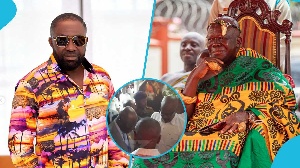Africa News of Friday, 6 June 2025
Source: www.ghanawebbers.com
African Union Condemns Trump Travel Ban Amid Strained Africa-U.S. Relations
The African Union (AU) is very concerned about President Donald Trump's travel ban. The ban affects citizens from seven African countries. It could harm diplomatic and commercial ties between the U.S. and Africa.
The travel ban, announced on Wednesday, targets Chad, Republic of the Congo, Equatorial Guinea, Eritrea, Libya, Somalia, and Sudan. Starting June 9, these citizens cannot enter the U.S. Burundi, Sierra Leone, and Togo also face partial restrictions.
In a statement on Thursday, the AU warned about negative impacts on people-to-people ties and educational exchanges. They emphasized that these relationships have taken decades to build.
The AU represents all 55 African nations. They urged Washington to adopt a more consultative approach with affected countries. They also called for transparent communication to address underlying issues.
The Trump administration justified the travel ban in a presidential proclamation. Equatorial Guinea and Republic of Congo were included due to visa overstays. Somalia and Libya were added because of terrorism concerns.
Trump mentioned a recent terror attack in Boulder as justification for the ban. He stated that foreign nationals who are not properly vetted pose extreme dangers to the U.S.
Somali authorities want to work with the U.S. to resolve security issues. Somali Ambassador Dahir Hassan Abdi expressed readiness for dialogue with the U.S.
However, residents in Mogadishu disagreed with Trump's decision. Salad Abdullahi Mohamed told AFP he opposed the travel ban strongly. Another resident argued that Somali migrants seek better lives for their families.
This travel ban adds strain to U.S.-Africa relations under Trump's second term. During his first term, Trump claimed previous travel restrictions prevented terror attacks in America.
Earlier this year, Trump imposed tariffs on many African countries as part of trade changes. Some tariffs were temporarily reduced but still affect economies significantly.
Relations worsened further when Trump confronted South African President Cyril Ramaphosa at a White House meeting about "white genocide."
In its statement, the AU highlighted mutual interests between Africa and the U.S., such as peace and prosperity. They acknowledged each nation's right to protect its borders but urged balanced actions reflecting long-standing partnerships.
Trump noted that restrictions depend on threats posed by each country and may change based on improvements made by those nations.











